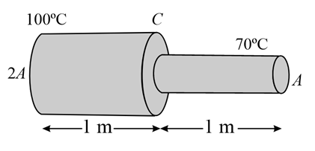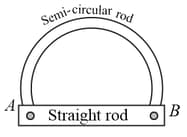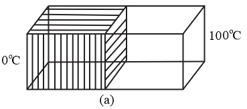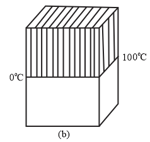Conduction
Conduction: Overview
This topic covers concepts, such as, Thermal Conduction, The Steady State Heat Flow, Appropriate Building Material for House & Appropriate Building Material for Nuclear Reactor etc.
Important Questions on Conduction
A metal rod of length has cross sectional areas and as shown in the figure. The ends are maintained at temperatures and . The temperature at middle point is___.

The end of a rod of length is maintained at and the end at . What is the temperature (in ) at a distance of from the end ?
What kind of building materials is appropriate for thermal conductivity?
What quality is required for the ppropriate Building Material for Nuclear Reactor ?
Heat transfer critical in nuclear reactors as Nuclear fission is heavily _____ reaction.
Heat transfer is critical for Nuclear reactors as nuclear fission is heavily exothermic reaction.
Why is heat transfer critical in nuclear reactors?
People prefer to give a layer of ____ on the ceiling so that heat transfer is prohibited and keeps the room cooler.
What should be done to prevent the transfer of heat through concrete roof during hot summer days?
What role does a layer of earth or foam provide on a house having a concrete ceiling during summer days?
Why do the houses made of concrete roof gets very hot during summer days?
Heat is passed through two cylindrical rods of same material. Their diameters and lengths are in the ratio and respectively. If their ends are maintained at same temperature difference, the ratio of rate of flow of heat through them is
What is the rate of flow of heat through a tapering rod of length tapering from radius and when the temperature of the ends are and and coefficient of thermal conductivity is
An icebox almost completely filled with ice at is dipped into a large volume of water at . The box has walls of surface area , thickness and thermal conductivity . Calculate the rate at which the ice melts in the box. Latent heat of fusion of ice .
Water is boiled in a container having a bottom of surface area , thickness and thermal conductivity . of water is converted into steam in the steady-state after the boiling starts. Assuming that no heat is lost to the atmosphere, calculate the temperature of the lower surface of the bottom. Latent heat of vaporization of water .
The normal body-temperature of a person is . Calculate the rate at which heat is flowing out of his body through the clothes assuming the following values. Room temperature , surface of the body under clothes , conductivity of the cloth, thickness of the cloth
A uniform slab of dimension is kept between two heat reservoirs at temperatures and , The larger surface areas touch the reservoirs. The thermal conductivity of the material is . Find the amount of heat flowing through the slab per minute.
In the following configuration, one semi-circular rod is connected to a straight rod of the same material and of the same cross-section. If the connection points and are maintained at different temperatures, then calculate the ratio of the heat transferred through a cross-section of a semi-circular rod to the heat transferred through a cross-section of the straight rod in a given time.

Two identical square rods of metal are welded as shown in figure end to end. In , of heat flows through it. If the rods are welded as shown in figure time taken in of heat flow is


